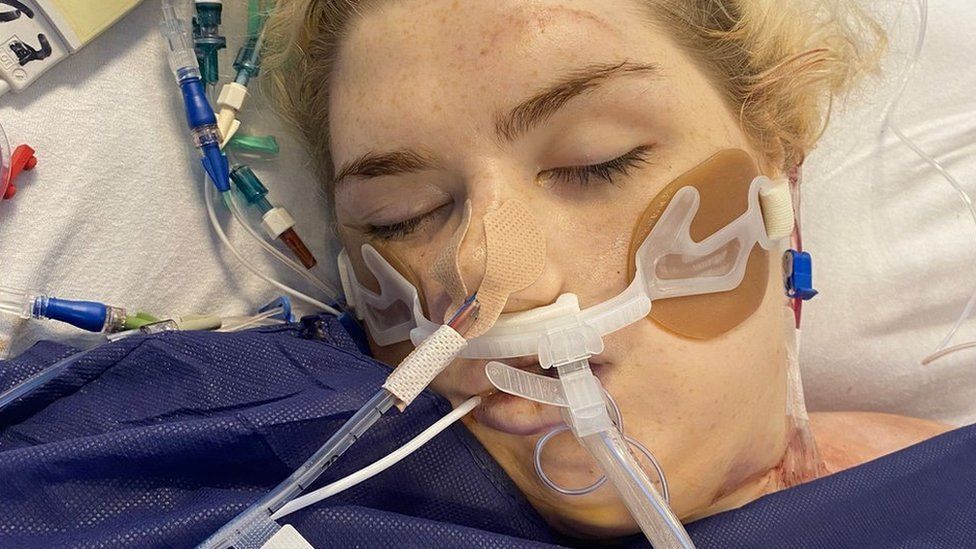
Andrea Logue should have been celebrating her 21st birthday later in September
The mothers of two young people who died after taking suspected “extra-strength” pills say people need to be aware street drugs are “lethal”.
Andrea Logue and Seán Pól Boyle died in separate incidents in the north west in August.
Their families have spoken to BBC Spotlight as part of an investigation into the supply of dangerous drugs.
Police say 14 people have been arrested since the start of June in connection with drug deaths.
This article contains details some readers may find distressing.
Both Andrea and Seán Pól died on 12 August.
Later that month, a Police Service of Northern Ireland (PSNI) officer told a court in Londonderry there had been three deaths and five heart attacks in one weekend, linked to super strength pregabalin tablets.
Andrea and Seán Pól’s families say they want other young people to know the dangers associated with un-prescribed medication.
Spotlight: Grieving mother’s warning after daughter’s drugs death
Andrea was 20 when she died in hospital after she was found unconscious at a friend’s house near her home in Strabane, County Tyrone.
“A doctor brought us into a private room and told us that Andrea was in a coma. Not [induced] by them, by whatever drug she’d taken,” her mother Amanda said.
“At about 15:00 he told us that there was nothing more he could do. We had to make the decision to turn off the machine.”
Image source, Amanda Logue
Andrea Logue would have celebrated her birthday later in September
Amanda said she wanted to warn other families of the dangers of illegal drugs being sold on the street under the guise of prescription medication.
“People think because it’s the same name as what a doctor prescribes, that it has to be the same thing,” she said.
“People need to be aware that they’re not the same as a prescription medicine, that they are lethal, they are dangerous and they do kill.”
‘I couldn’t save him’
Rosemary Lynn’s son Seán Pól would have celebrated his 29th birthday on Tuesday.
The father of two died as the result of a suspected heart attack, believed to have been caused by taking the extra-strength pregabalin pills.
“Dealers need to be taken off the streets because they are murdering our children,” Rosemary said.
“I’m angry at the people that dealt these drugs to him because they took my son. They took my child.”
Image source, Rosemary Lynn
Seán Pól Boyle with his mother Rosemary Lynn
Seán Pól had been released from prison weeks prior to his death, and had a history of drug addiction.
Rosemary was asked to accompany police to identify her son’s body in the property where he died.
“The hardest thing ever [is] lying over the top of your son, lying over the top of your baby boy and there’s nothing you can do to save him,” she said.
“All a mammy wants to do is protect her children and I could not protect him from these drug dealers. I couldn’t save him.”
Rosemary Lynn said her son should have been celebrating his birthday on Tuesday
Spotlight was able to have drugs delivered to an undercover journalist as part of the investigation.
Laboratory testing revealed the pills they obtained were bromazolam, a synthetic benzodiazepine, which the PSNI said was a common factor in a wave of overdoses in Belfast in July.
The drugs were safely disposed of after testing.
Bromazolam has not been approved for use in the United Kingdom but is becoming a common ingredient in street drugs.
Security and community sources have told BBC Spotlight that the East Belfast UVF (Ulster Volunteer Force) is one of the major suppliers of the potentially lethal pills.
‘Serious risk to life’
Coroner Joe McCrisken told the programme bromazolam had been implicated in a number of deaths in Northern Ireland.
Spotlight can report that criminal gangs and paramilitaries are increasingly buying the drugs in bulk.
They are often sold on in batches of 20 or 50 on closed social media sites and encrypted messaging apps.
One dealer, who was secretly filmed by BBC Spotlight, boasted to the undercover reporter about the quality of the illegal pills he was selling.
Mr McCrisken described the drugs, which are sold on the street as yellows or benzos, as “incredibly potent”.
“It poses comparatively higher risks than other legally prescribed benzodiazepines, due to its ability to produce strong sedation and amnesia even at a low dosage,” he said.
Coroner Joe McCrisken says bromazolam has been implicated in a number of deaths in Northern Ireland
Other pills given to the undercover reporter, who was secretly recording the exchange, were referred to online as “blues”.
Testing in a lab has confirmed they contained New Psychoactive Substances (NPS), often known as so called “legal highs”.
Despite the name, these drugs are still illegal under the Misuse of Drugs Act 1971.
In a statement, the PSNI said it had made 14 arrests in relation to drug-related deaths within Northern Ireland since the start of June.
The PSNI also said it was working with national and international law enforcement partners, including An Garda Síochána (Irish police) to target suppliers and supply lines.
Det Supt Emma Neill said 14 people have been arrested in connection with drug-related deaths sine June
Det Supt Emma Neill said the supply online, and via social media apps, is actively being investigated, and that the police could not comment further “for operational reasons”.
If you have been affected by addiction, help and support is available at BBC Action Line.
If you live in Northern Ireland, you can also call Lifeline, a 24 hour helpline on 0808 808 8000.
Spotlight: Deadly Little Pills is available to watch now on BBC iPlayer.








